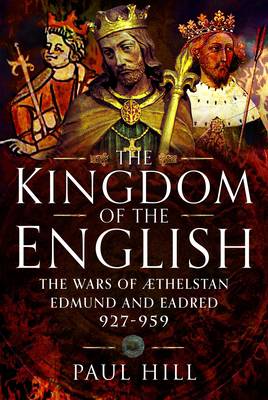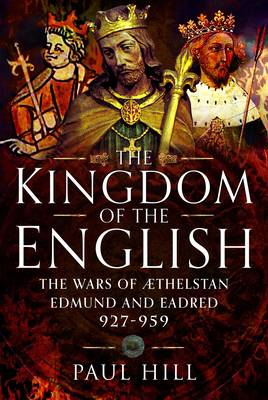
- Afhalen na 1 uur in een winkel met voorraad
- Gratis thuislevering in België vanaf € 30
- Ruim aanbod met 7 miljoen producten
- Afhalen na 1 uur in een winkel met voorraad
- Gratis thuislevering in België vanaf € 30
- Ruim aanbod met 7 miljoen producten
Zoeken
The Kingdom of the English
The Wars of Athelstan, Edmund and Eadred, 927-959
Paul Hill
Hardcover | Engels
€ 34,95
+ 69 punten
Omschrijving
In this the third part of his four-volume military and political history of early England Paul Hill explores the rise of Æthelstan, first-born son of Edward the Elder and grandson of Alfred the Great. His reign saw an expanded English kingdom thanks to the efforts of his aunt Æthelflæd and his father, but Æthelstan's prestige had much to do with his own extraordinary ability. Courts across Europe felt the king's influence through carefully planned marriages, while he firmly stamped his authority at home.
This volume traces the challenges in Æthelstan's reign after he established power in the north in 927 and explores the mystery surrounding his half-brother Edwin's unusual death. But it also looks at the great military campaigns of the time. The English campaign in Scotland in 934 and the tumultuous encounter between Æthelstan's forces and a northern alliance at the now lost - but perhaps found - battlefield of Brunanburh in 937 are examined. So too is the passionate history of the hunt for the battle site. Also told is a fresh account of the campaigns and fortunes of the king's brothers Edmund and Eadred who succeeded Æthelstan in turn.
The kingdom was by no means secure though. The warrior kings came again. Hill's narrative portrays the deeds of the evocatively named Eric 'Bloodaxe' of York and the bitter end of an independent Viking northern kingdom which had so bedevilled the kings of the south. Were the fields of Britain finally consolidated into one (as one chronicler said) or was there more trouble ahead?
This volume traces the challenges in Æthelstan's reign after he established power in the north in 927 and explores the mystery surrounding his half-brother Edwin's unusual death. But it also looks at the great military campaigns of the time. The English campaign in Scotland in 934 and the tumultuous encounter between Æthelstan's forces and a northern alliance at the now lost - but perhaps found - battlefield of Brunanburh in 937 are examined. So too is the passionate history of the hunt for the battle site. Also told is a fresh account of the campaigns and fortunes of the king's brothers Edmund and Eadred who succeeded Æthelstan in turn.
The kingdom was by no means secure though. The warrior kings came again. Hill's narrative portrays the deeds of the evocatively named Eric 'Bloodaxe' of York and the bitter end of an independent Viking northern kingdom which had so bedevilled the kings of the south. Were the fields of Britain finally consolidated into one (as one chronicler said) or was there more trouble ahead?
Specificaties
Betrokkenen
- Auteur(s):
- Uitgeverij:
Inhoud
- Aantal bladzijden:
- 240
- Taal:
- Engels
Eigenschappen
- Productcode (EAN):
- 9781526782533
- Verschijningsdatum:
- 30/08/2026
- Uitvoering:
- Hardcover
- Formaat:
- Genaaid
- Afmetingen:
- 159 mm x 235 mm

Alleen bij Standaard Boekhandel
+ 69 punten op je klantenkaart van Standaard Boekhandel
Beoordelingen
We publiceren alleen reviews die voldoen aan de voorwaarden voor reviews. Bekijk onze voorwaarden voor reviews.








